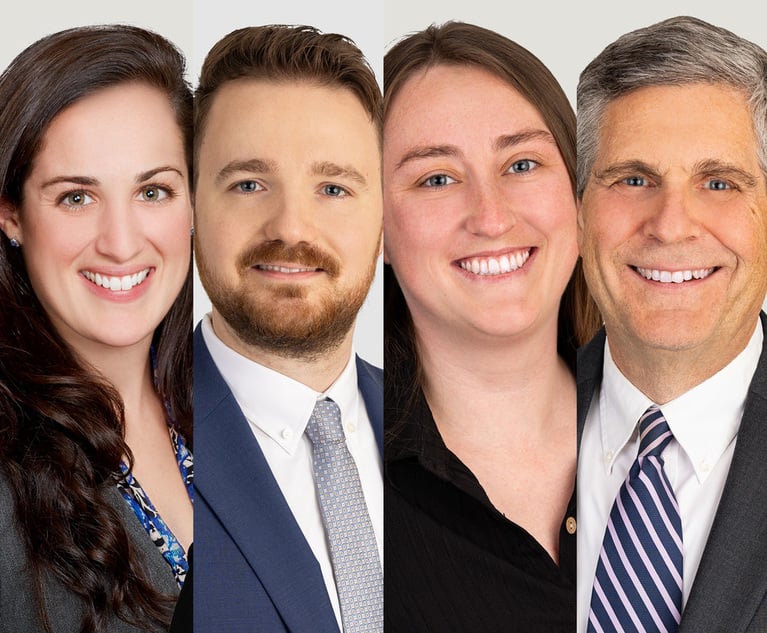 U.S. Department of Justice logo
U.S. Department of Justice logo2nd Circuit Denies Release for Convicted Ponzi Schemer
In March 2011, appellant Francisco Illarramendi pleaded guilty to two counts of wire fraud, and one count each of securities fraud, investor fraud and conspiracy to obstruct justice after a Ponzi scheme defrauded investors of at least $382.2 million.
October 18, 2018 at 03:22 PM
4 minute read
The U.S. Court of Appeals for the Second Circuit has affirmed imprisonment for a Venezuelan financier and former New Canaan resident who was sentenced in 2015 to 15 years behind bars for wire and securities fraud in what prosecutors called “the biggest Ponzi scheme in Connecticut history.”
In March 2011, appellant Francisco Illarramendi, 49, pleaded guilty to two counts of wire fraud, and one count each of securities fraud, investor fraud and conspiracy to obstruct justice after a Ponzi scheme defrauded investors of at least $382.2 million. He was sentenced on Jan. 2, 2015, by Judge Stefan Underhill to 156 months of imprisonment followed by three years of supervised release, plus payment of approximately $370 million in restitution.
“For more than five years, Francisco Illarramendi's severely misguided attempt to conceal an initial loss of $5 million ballooned into an elaborate fraud scheme that caused investors and creditors to lose hundreds of millions of dollars,” First Assistant U.S. Attorney Michael J. Gustafson said in a 2015 press release. “Through it all, he still managed to live well, receiving more than $20 million in personal benefits. I want to thank our partners at the FBI and SEC for unravelling this complex scheme, and acknowledge the efforts of the court-appointed receiver who has recovered more than $300 million that will be distributed to the victims.”
According to court documents, Illarramendi founded the Michael Kenwood Group in 2006 in Stamford, which was not registered with the U.S. Securities and Exchange Commission. A hedge fund he advised lost approximately $5 million. “Rather than disclose to his investors the truth about the losses incurred, Illarramendi concealed this information by engaging in a scheme to defraud and mislead his investors and creditors,” the U.S. Attorney's Office for the District of Connecticut wrote. “As a result of the scheme, the hedge funds and related entities managed and advised by Illarramendi had outstanding liabilities that greatly exceed the true value of their assets, causing the funds' investors, creditors and service providers to lose more than $700 million.”
While awaiting trial, Illarramendi reportedly failed to disclose that he spent most of a $630,000 state tax refund, resulting in revocation of his bond.
While incarcerated, in November 2016, Illarramendi filed a habeas corpus petition claiming he had been denied counsel of choice due to his assets being frozen in a related SEC civil proceeding and that his counsel provided ineffective assistance during plea negotiations and sentencing.
In August 2017, Illarramendi filed two additional motions pro se in district court seeking “supervised release pending habeas proceedings.” The district court denied the motions, stating that it “has no authority to grant supervised release to a sentenced inmate.” Illarramendi appealed unsuccessfully, but was granted a motion for leave to proceed in forma pauperis. Though the Second Circuit affirmed the district court's denial of Illarramendi's motions for supervised release, it agreed with the appellant that a certificate of appealability was not required when appealing orders from a habeas proceeding.
“We agree with the United States that neither supervised release nor bail is warranted here and therefore GRANT the motion for summary affirmance,” the court wrote. “A certificate of appealability from the district court's order is not necessary, however, because a denial of supervised release or bail is not a 'final order that disposes of the merits of a habeas corpus proceeding.' (Harbison v. Bell, 556 U.S. 180, 183, (2009)).”
“Although Illarramendi's motion was for supervised release, we liberally construe his pro se motion as seeking release on bail,” the court added. “The government accepts this interpretation in its memorandum in support of its motion to summarily affirm.”
Assistant U.S. Attorney Michael J. Gustafson could not be reached for comment.
This content has been archived. It is available through our partners, LexisNexis® and Bloomberg Law.
To view this content, please continue to their sites.
Not a Lexis Subscriber?
Subscribe Now
Not a Bloomberg Law Subscriber?
Subscribe Now
NOT FOR REPRINT
© 2024 ALM Global, LLC, All Rights Reserved. Request academic re-use from www.copyright.com. All other uses, submit a request to [email protected]. For more information visit Asset & Logo Licensing.
You Might Like
View All
Managing Partner Vindicated in Disciplinary Proceeding Brought by Former Associate
5 minute read
Connecticut Movers: Year-End Promotions, Hires and an Office Opening
5 minute read
GC Pleads Guilty to Embezzling $7.4 Million From 3 Banks

Trending Stories
- 1Decision of the Day: Judge Reduces $287M Jury Verdict Against Harley-Davidson in Wrongful Death Suit
- 2Kirkland to Covington: 2024's International Chart Toppers and Award Winners
- 3Decision of the Day: Judge Denies Summary Judgment Motions in Suit by Runner Injured in Brooklyn Bridge Park
- 4KISS, Profit Motive and Foreign Currency Contracts
- 512 Days of … Web Analytics
Who Got The Work
Michael G. Bongiorno, Andrew Scott Dulberg and Elizabeth E. Driscoll from Wilmer Cutler Pickering Hale and Dorr have stepped in to represent Symbotic Inc., an A.I.-enabled technology platform that focuses on increasing supply chain efficiency, and other defendants in a pending shareholder derivative lawsuit. The case, filed Oct. 2 in Massachusetts District Court by the Brown Law Firm on behalf of Stephen Austen, accuses certain officers and directors of misleading investors in regard to Symbotic's potential for margin growth by failing to disclose that the company was not equipped to timely deploy its systems or manage expenses through project delays. The case, assigned to U.S. District Judge Nathaniel M. Gorton, is 1:24-cv-12522, Austen v. Cohen et al.
Who Got The Work
Edmund Polubinski and Marie Killmond of Davis Polk & Wardwell have entered appearances for data platform software development company MongoDB and other defendants in a pending shareholder derivative lawsuit. The action, filed Oct. 7 in New York Southern District Court by the Brown Law Firm, accuses the company's directors and/or officers of falsely expressing confidence in the company’s restructuring of its sales incentive plan and downplaying the severity of decreases in its upfront commitments. The case is 1:24-cv-07594, Roy v. Ittycheria et al.
Who Got The Work
Amy O. Bruchs and Kurt F. Ellison of Michael Best & Friedrich have entered appearances for Epic Systems Corp. in a pending employment discrimination lawsuit. The suit was filed Sept. 7 in Wisconsin Western District Court by Levine Eisberner LLC and Siri & Glimstad on behalf of a project manager who claims that he was wrongfully terminated after applying for a religious exemption to the defendant's COVID-19 vaccine mandate. The case, assigned to U.S. Magistrate Judge Anita Marie Boor, is 3:24-cv-00630, Secker, Nathan v. Epic Systems Corporation.
Who Got The Work
David X. Sullivan, Thomas J. Finn and Gregory A. Hall from McCarter & English have entered appearances for Sunrun Installation Services in a pending civil rights lawsuit. The complaint was filed Sept. 4 in Connecticut District Court by attorney Robert M. Berke on behalf of former employee George Edward Steins, who was arrested and charged with employing an unregistered home improvement salesperson. The complaint alleges that had Sunrun informed the Connecticut Department of Consumer Protection that the plaintiff's employment had ended in 2017 and that he no longer held Sunrun's home improvement contractor license, he would not have been hit with charges, which were dismissed in May 2024. The case, assigned to U.S. District Judge Jeffrey A. Meyer, is 3:24-cv-01423, Steins v. Sunrun, Inc. et al.
Who Got The Work
Greenberg Traurig shareholder Joshua L. Raskin has entered an appearance for boohoo.com UK Ltd. in a pending patent infringement lawsuit. The suit, filed Sept. 3 in Texas Eastern District Court by Rozier Hardt McDonough on behalf of Alto Dynamics, asserts five patents related to an online shopping platform. The case, assigned to U.S. District Judge Rodney Gilstrap, is 2:24-cv-00719, Alto Dynamics, LLC v. boohoo.com UK Limited.
Featured Firms
Law Offices of Gary Martin Hays & Associates, P.C.
(470) 294-1674
Law Offices of Mark E. Salomone
(857) 444-6468
Smith & Hassler
(713) 739-1250










